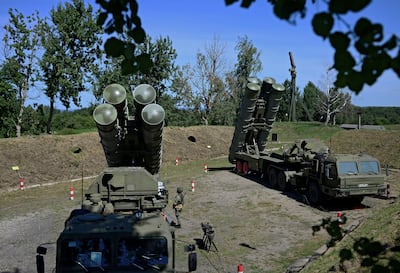Live updates: follow the latest news on Russia-Ukraine
US sanctions on Russia could significantly damage the country’s arms industry, which exports about $15 billion of weapons a year, including for the Iraqi army which continues to battle an ISIS insurgency.
A US official told The National on condition of anonymity that Washington is looking for full implementation of the sanctions but could grant waivers to nations such as Iraq, in strict cases and based on “national security exceptions”.
Baghdad ordered more than $1bn of Russian tanks in 2017 and has been considering purchasing multibillion-dollar Russian anti-aircraft systems, including the S-300 and S-400. Many of Iraq’s existing armoured vehicles are made in Russia.
Sanctions imposed on Russian arms manufacturers have grown tougher over the years.
A round of sanctions hit manufacturers including Kalashnikov after the annexation of Crimea in 2014, while a 2017 law known as Countering America’s Adversaries through Sanctions (CAATSA) put companies dealing with Russian companies in danger of being subjected to so-called secondary sanctions.
A US president can waive the measures for key allies, however, which appears to have been done for Egypt and India.
Washington placed sanctions on several Turkish defence officials under CAATSA in 2020, after Ankara purchased the Russian S-400 system.
After the Ukraine invasion, dealing with Russian defence companies is fraught with risk, US State Department official Donald Lu recently told a Senate Foreign Relations panel.
Exemptions would need approval from US President Joe Biden but only after making the case that these countries are trying to phase out Russian arms imports in the long run.
Bilal Wahab, a senior scholar who studies Iraq at the Washington Institute for Near East Policy, said Baghdad is attempting to balance different interests with its reaction to the war.
“Iraq has abstained from condemning the Russian invasion of Ukraine at the UNGA. That is a factor of Iranian influence on one hand and keeping the door open for ties with Russia,m especially as Iraqis feel the US is becoming increasingly aloof,” Mr Wahab told The National.
He said Russian defence co-operation was still necessary for the Iraqi government in the absence of US alternatives.
“The Iranian missile attacks on Erbil should focus Iraq's need for developing its own missile and air defence systems. With US Patriot missile systems in short supply and needed urgently in Europe, Baghdad could rekindle discussions it had with Moscow over the purchase of the Russian S-300 system,” he said.
Iraq has floated the idea of purchasing the S-300 and the more advanced S-400 system since 2018.

Hakim Al Zamili, a former militia commander loyal to Moqtada Al Sadr, whose party holds the majority of seats in Iraq’s Parliament, told Russia’s Tass news agency that the S-400 could “stop Iraq from becoming an open arena for realisation of US plans”.
Al Zamili was formerly head of the parliamentary security and defence committee and is now deputy speaker.
This month, Iraqi-Kurdish news agency Rudaw reported that the Central Bank of Iraq had suggested the Iraqi government holds off signing contracts with Russia “to protect the Iraqi financial system” from western sanctions.
US arming Iraq
The US has provided Iraq with tens of billions of dollars of military equipment since 2003, an issue that made headlines when ISIS seized hundreds of Humvees and artillery pieces as they took Mosul in 2014.
While some equipment was donated, much has been purchased, notably 36 F-16 fighter jets, in deals worth at least $4.3bn with continuing maintenance contracts. The US also gave Iraq a $3bn credit line to buy US weapons during the war on ISIS.
Big-ticket items supplied to Baghdad include about 140 M1A1 Abrams tanks, an older model of what analysts regard as one of the best tanks in the world.
The US donated about 250 Mine Resistant Armoured Personnel Carriers (MRAPs) at the height of the war against ISIS, a small number of replacement M1A1 tanks and tens of thousands of small arms, including 10,000 M16 assault rifles in a single donation in 2015.
Some experts say that Iraqis prefer Russian equipment, which made up the bulk of the Iraqi army’s gear during Saddam Hussein’s rule, as well as post-2003.
US equipment is considered high maintenance and prone to breakdown without specially trained mechanics. At the height of the war with ISIS, amid an oil price collapse, Iraq borrowed $2.7bn solely to maintain high-end US weapons.
In lieu of more complex US systems, Iraq has increased purchases of Russian tanks including the T-90S made by Uralvagonzavod. Iraq already has a fleet of 73 T-90Ss and is building a new brigade of the vehicles.
Iraq has also placed large orders for the BMP-3 infantry carrier made by Kurganmashzavod.
Uralvagonzavod was sanctioned by the US after the Crimea annexation, as Kurganmashzavod was in March. Both companies could struggle to obtain vital foreign-made components for their vehicles.
Iraqi army’s plan B
Iraqi military leaders have plans to avoid repercussions, a senior Defence Ministry official told The National.
“Our sources for arms are widely varied as we have different agreements, understandings and good relations and co-operation with many countries in this regard,” the official said. “Besides the US, our weapons are coming from some European countries including Ukraine, China, South Korea and others.
“We can rely on other countries, mainly the Eastern European ones, who still produce Russian arms and even spare parts."
Iraq has begun talks with countries such as Saudi Arabia, the UAE and France to boost security co-operation but they are still at early stages, he said.
The country is working on expanding its own military industry, revived after 2014 with production lines for ammunition.
“There’s still a long way to go but it can meet some of our needs now and can be expanded with further co-operation with other countries,” the official said.













